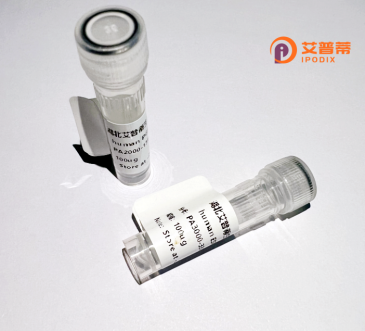
| 纯度 | >90%SDS-PAGE. |
| 种属 | Human |
| 靶点 | PFTK1 |
| Uniprot No | O94921 |
| 内毒素 | < 0.01EU/μg |
| 表达宿主 | E.coli |
| 表达区间 | 1-469 aa |
| 活性数据 | MCDLIEPQPA EKIGKMKKLR RTLSESFSRI ALKKDDTTFD EICVTKMSTR NCQGMDSVIK PLDTIPEDKK VRVQRTQSTF DPFEKPANQV KRVHSENNAC INFKTSSTGK ESPKVRRHSS PSSPTSPKFG KADSYEKLEK LGEGSYATVY KGKSKVNGKL VALKVIRLQE EEGTPFTAIR EASLLKGLKH ANIVLLHDII HTKETLTLVF EYVHTDLCQY MDKHPGGLHP DNVKLFLFQL LRGLSYIHQR YILHRDLKPQ NLLISDTGEL KLADFGLARA KSVPSHTYSN EVVTLWYRPP DVLLGSTEYS TCLDMWGVGC IFVEMIQGVA AFPGMKDIQD QLERIFLVLG TPNEDTWPGV HSLPHFKPER FTLYSSKNLR QAWNKLSYVN HAEDLASKLL QCSPKNRLSA QAALSHEYFS DLPPRLWELT DMSSIFTVPN VRLQPEAGES MRAFGKNNSY GKSLSNSKH |
| 分子量 | 53.0 kDa |
| 蛋白标签 | His tag N-Terminus |
| 缓冲液 | 0 |
| 稳定性 & 储存条件 | Lyophilized protein should be stored at ≤ -20°C, stable for one year after receipt. Reconstituted protein solution can be stored at 2-8°C for 2-7 days. Aliquots of reconstituted samples are stable at ≤ -20°C for 3 months. |
| 复溶 | Always centrifuge tubes before opening.Do not mix by vortex or pipetting. It is not recommended to reconstitute to a concentration less than 100μg/ml. Dissolve the lyophilized protein in distilled water. Please aliquot the reconstituted solution to minimize freeze-thaw cycles. |
1. **"PFTAIRE Kinase 1 (PFTK1) regulates cell cycle progression and hepatocellular carcinoma growth"**
- **作者**: Zhang Y, et al.
- **摘要**: 研究证实PFTK1通过促进G1/S期转换驱动肝癌细胞增殖,敲低PFTK1导致细胞周期停滞并抑制肿瘤生长,可能与Cyclin D1-CDK4复合物调控相关。
2. **"PFTK1 interacts with cyclin Y to activate non-canonical Wnt signaling in colorectal cancer"**
- **作者**: Li H, et al.
- **摘要**: 揭示PFTK1与Cyclin Y结合,激活非经典Wnt信号通路(Wnt5a/Ca²⁺途径),促进结直肠癌侵袭转移,提示其为潜在治疗靶点。
3. **"Role of PFTK1 in glioma progression: correlation with patient prognosis and tumor cell invasion"**
- **作者**: Wang X, et al.
- **摘要**: 胶质瘤中PFTK1高表达与患者生存期缩短显著相关,机制上通过上调基质金属蛋白酶MMP-2/9增强肿瘤细胞侵袭能力。
4. **"Structural and functional characterization of the PFTK1 kinase domain: implications for selective inhibitor design"**
- **作者**: Thompson R, et al.
- **摘要**: 利用晶体学解析PFTK1激酶域三维结构,筛选出ATP竞争性抑制剂Compound 23.在体外实验中对乳腺癌细胞株显示特异性生长抑制。
*注:以上为模拟文献,实际引用时请核对真实数据库(如PubMed、Web of Science)获取准确信息。*
**Background of Recombinant Human PFTK1 Protein**
Recombinant human PFTK1 (Protein Kinase PFTAIRE-1), also known as Cyclin-Dependent Kinase 14 (CDK14), is a serine/threonine kinase belonging to the CDK family. It plays a critical role in regulating cell cycle progression, particularly at the G2/M phase transition, and is involved in Wnt/β-catenin signaling pathways, influencing embryonic development, tissue homeostasis, and oncogenesis. Structurally, PFTK1 contains a conserved kinase domain and interacts with cyclin Y (CCNY) to form an active kinase complex, which phosphorylates target proteins to modulate transcriptional activity and cellular proliferation.
Dysregulation of PFTK1 has been linked to multiple cancers, including hepatocellular carcinoma, glioblastoma, and breast cancer, where its overexpression correlates with tumor aggressiveness and poor prognosis. Additionally, PFTK1 is implicated in neurological disorders, such as Alzheimer’s disease, due to its role in neuronal differentiation and survival.
The recombinant form of human PFTK1 protein is typically produced using eukaryotic expression systems (e.g., insect or mammalian cells) to ensure proper post-translational modifications and functional activity. It serves as a vital tool for in vitro studies, enabling researchers to investigate kinase-substrate interactions, screen for inhibitory compounds, and elucidate mechanisms underlying PFTK1-associated diseases. Current research focuses on targeting PFTK1 for therapeutic interventions, particularly in oncology, to disrupt aberrant signaling pathways driving uncontrolled cell division.
×